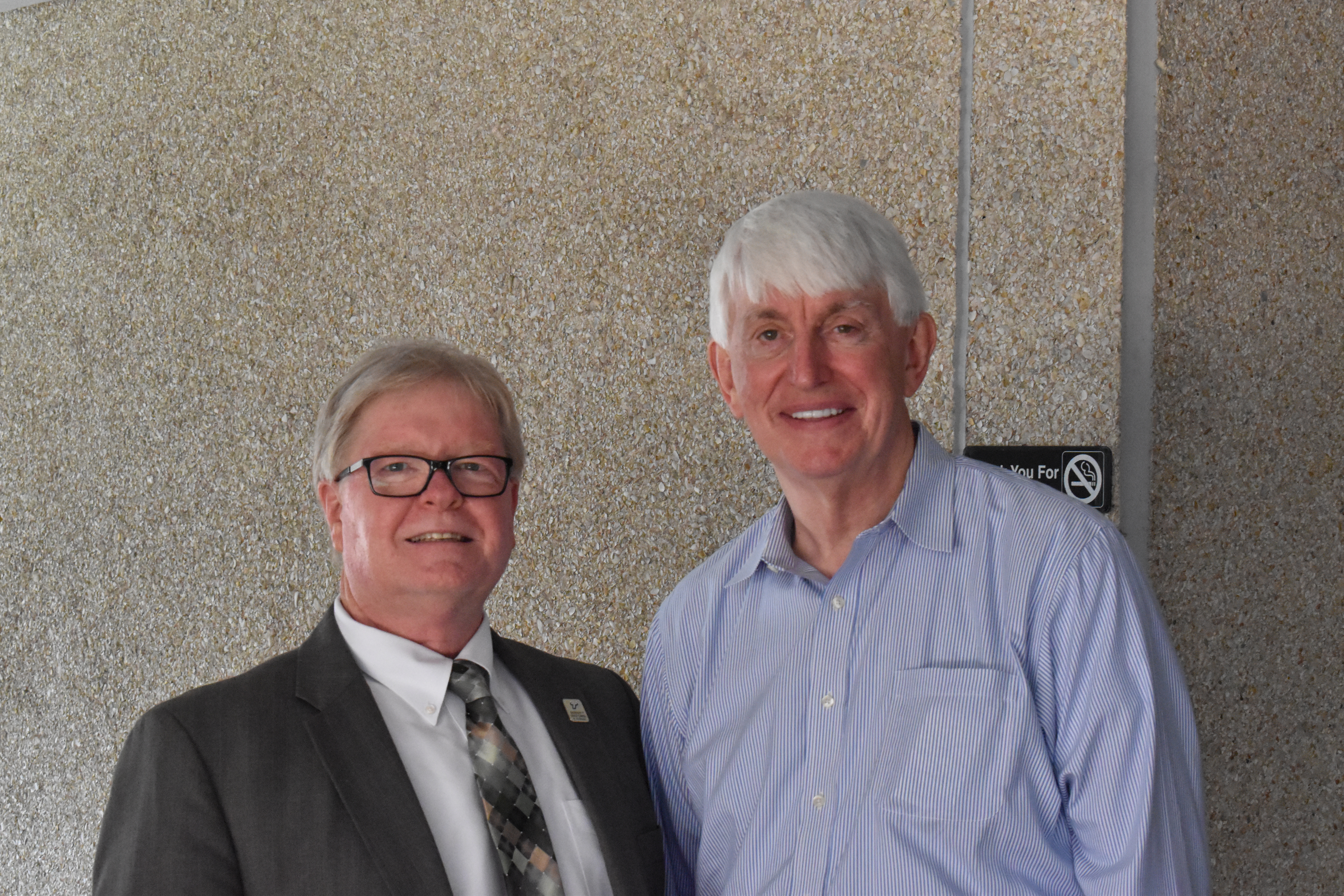Provost Ralph Wilcox met with faculty from the College of Arts and Sciences last week to discuss its fate.

James Bennett III | The Crow’s Nest
By Nancy McCann
When the USF system’s three campuses are consolidated in July, St. Petersburg will have distinctive programs in education, finance and environmental sciences.
It also will apparently keep its department of journalism.
Those are the predictions of Ralph Wilcox, who as provost of the three-campus university could wind up with oversight of all academic and student services.
In an interview with The Crow’s Nest on Friday, Wilcox said that consolidation planners are “absolutely committed to preserving, promoting and investing in programs …that will collectively elevate the stature of one preeminent research university” on all three campuses.
Wilcox’s comments came a day after he met privately with faculty from St. Petersburg’s College of Arts and Sciences, the nexus of most of the opposition to USF system President Steve Currall’s “preliminary blueprint” on consolidation.
Wilcox, Regional Chancellor Martin Tadlock and Magali Michael, the arts and sciences dean in St. Petersburg, said afterward that the meeting with faculty was productive and honest.
Apparently left dangling, however, were consolidation’s biggest questions:
Will St. Petersburg and Sarasota-Manatee become full branch campuses, as ordered by the Legislature earlier this year? Or will Currall and the Board of Trustees try to somehow maneuver around that mandate?
Currall’s preliminary plan was denounced by key Pinellas County legislators, the Tampa Bay Times editorial board and Ray Arsenault, president of the USF St. Petersburg Faculty Senate.
In reply, Currall stressed that revisions were in the works, and Wilcox said a new plan will be released within a month.
It has been apparent for months that the Kate Tiedemann College of Business in St. Petersburg will become a school of business and finance.
There also has been discussion about “reaffirming some distinct identity” at the College of Education here, perhaps in “STEM education,” Wilcox said.
In the interview with The Crow’s Nest, Wilcox indicated that other important programs are also headed to St. Petersburg.
Those would be in “marine science and allied fields associated with environmental science, conservation biology, environmental chemistry (and) sustainability programs,” he said.
“Those are academic programs, not distinct departments per se, that will likely cluster with one another to take the form of an interdisciplinary center of academic and research excellence,” he said.
The cluster would be based in St. Petersburg “but serving the needs of students and faculty and maybe also drawing upon the expertise of faculty” in Tampa and Sarasota-Manatee.
Now, it also appears that the campus will keep its journalism department.
Currall “heard loud and clear” that it is important to preserve the Department of Journalism and Digital Communication, Wilcox said.
The St. Petersburg department and its chairman, associate professor Casey Frechette, had lobbied vigorously to remain separate from the larger Zimmerman School of Advertising and Mass Communications in Tampa.
In a Sept. 23 letter to Pinellas legislators, the journalism faculty said Currall’s preliminary plan would jeopardize the department’s stature as one of only four professionally accredited journalism programs in Florida.
The plan would also threaten “our award-winning independent student newspaper, The Crow’s Nest, which has operated for 50 years,” the letter said, and would undermine the department’s Neighborhood News Bureau, which gives students “practical learning experiences” in the city’s Midtown neighborhood.
Frechette welcomed word that his department apparently will be preserved. Like Wilcox, he stressed that the St. Petersburg journalism faculty must be prepared to serve students in Sarasota-Manatee and Tampa as well.
Wilcox’s meeting with several dozen members of St. Petersburg’s arts and sciences faculty was one of several recent meetings he has had with faculty and staff at the USF system’s two smaller campuses.
Some who attended the meeting called it beneficial. But several others groused privately that it seemed flat and uncomfortable.
Wilcox called it “a fruitful exercise” for him, as the university system’s chief academic officer, and said St. Petersburg faculty are right to have questions “about the level of support that they will be provided” after consolidation takes effect.
Tadlock said that Wilcox assured faculty at the meeting that the “overriding concern is that we do no harm” under consolidation.
As an example, Tadlock mentioned that the subject of tenure was raised by a faculty member.
In an email to The Crow’s Nest on Oct. 1, Wilcox reiterated the guidelines he said he explained to faculty at the meeting.
“Tenure-earning faculty, initially hired at USF St. Petersburg and USF Sarasota-Manatee with three years of tenure-earning credit on July 1, 2019 (i.e. generally those hired in Fall 2016 or earlier), will be considered for tenure consistent with local (i.e. USF St. Petersburg or USF Sarasota-Manatee) department, school, college, and institutional guidelines in place prior to consolidation,” Wilcox wrote.
Wilcox added that there may be exceptions based on commitments to individual faculty members specified in their appointment letters.
Wilcox told The Crow’s Nest that the arts and science faculty made it “abundantly clear” that the “window is closing” and clarity is needed for preparing summer 2020 class schedules, completing faculty assignments and making decisions that impact the academic progression of students.
Frechette said after the faculty meeting with Wilcox that the most important takeaway was to keep speaking out.
“We need to keep advocating for ourselves as a campus. We need to keep talking about the intrinsic worth we have as a campus,” he said. “We need to keep thinking about how we can contribute to the consolidated university while remaining true to ourselves.
“Let’s get some more departments (on the St. Pete campus) now.”
This story has been updated with additional information from Provost Ralph Wilcox about tenure guidelines related to consolidation.



